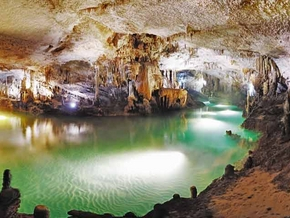
Lebanon is rich in water resources, compared to most other Arab countries, but as people celebrated World Water Day yesterday, the Daily Star reported that the authorities in Beirut expressed concern about the rapid and uncontrolled urban expansion that has led to a serious degradation of the water quality in much of the country.
The effects of this on the country’s New7Wonders of Nature Official Finalist, Jeita Grotto, were noted:
“One of the most spectacular boat rides in the country takes visitors through the Lower Jeita Grotto, but its seemingly pristine waters are teeming with bacteria throughout much of the year. Although much of this contamination can be removed by appropriate treatment, it is still worrisome because the Jeita and nearby Kashkoush springs are, in fact, the most important sources of water for Beirut and its surrounding neighborhoods. Roughly a third of all Lebanese use this water on a regular basis, if not at home then at work.
Most of the area above the Jeita springs, all the way up to the slopes of Mzaar, has become rife with residential and touristic real-estate development. However, the infrastructure is not keeping pace and there is currently not a single functioning wastewater treatment plant in the area.”
The Daily Star points out that several projects funded by the European Union, Italy and Germany are under way to create an infrastructure for wastewater collection and treatment. Germany’s Federal Institute for Geosciences and Natural Resources is working with the Lebanese authorities on the geo-scientific aspects of the projects. “These wastewater treatment facilities will relieve some of the urban pressures and hopefully reduce bacteriological contamination in the Jeita springs,” notes the Daily Star.

